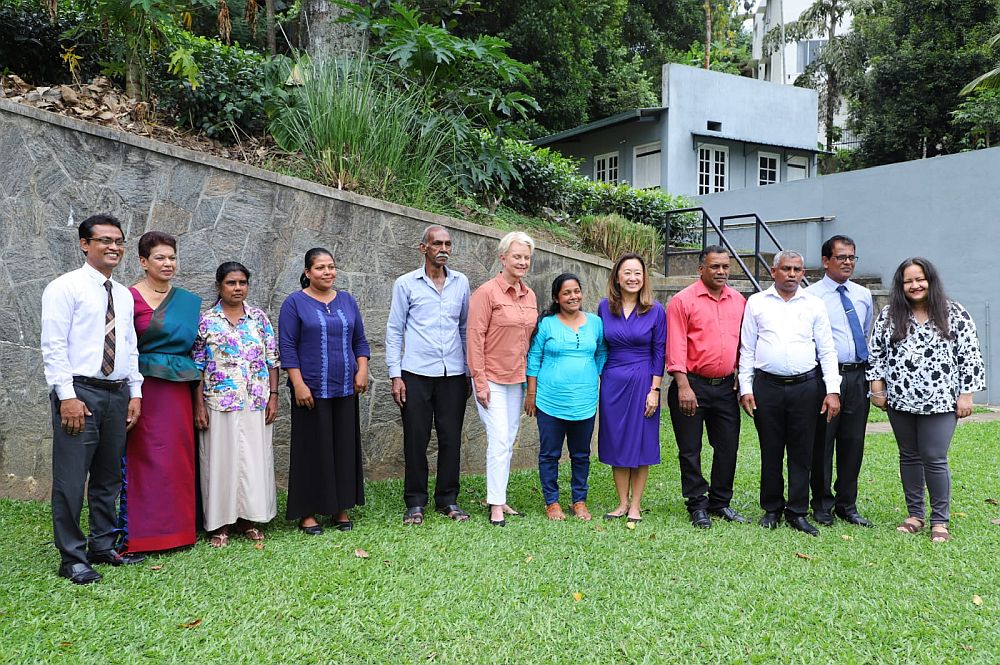US Ambassador Cindy Mccain’s visit to Sri Lanka highlights work on food security by FAO, IFAD and WFP
IFAD Asset Request Portlet
Publicador de contenidos
US Ambassador Cindy McCain’s visit to Sri Lanka highlights work on food security by FAO, IFAD and WFP
29 septiembre 2022 |
| Ambassadors Cindy McCain and Julie Chung met tea farmers and project staff from IFAD and Government of Sri Lanka's Smallholder Tea and Rubber Revitalization programme. |
Colombo, 28 September 2022 – The United States Permanent Representative to the UN Agencies in Rome, Ambassador Cindy McCain concluded a two-day official visit to the North Western and Central Provinces of Sri Lanka today. Accompanied by the United States Ambassador to Sri Lanka, Julie Chung, Ambassador McCain visited several projects of the Food and Agriculture Organization of the United Nations (FAO), the United Nations World Food Programme (WFP), and the International Fund for Agricultural Development (IFAD).
“I am very pleased to have been able to see in person the positive impact the UN food and agricultural agencies are having here in Sri Lanka,” Ambassador McCain remarked at the conclusion of her visit. “The projects we saw over the past few days showcase how the U.S. government, the UN food and agriculture agencies and the government of Sri Lanka can collaborate to reduce hunger and food insecurity, and improve nutrition and livelihoods for vulnerable communities. We must continue to reinforce this collaboration to ensure the people of Sri Lanka can recover and thrive.”
“The United States is committed to supporting the Sri Lankan people to emerge from this crisis, and our robust support to WFP and FAO are an essential part of that response,” said U.S. Ambassador to Sri Lanka Julie Chung. “Our total assistance to Sri Lanka during the crisis now totals nearly $239 million, funding that supports food security and addresses the needs of vulnerable communities through FAO and WFP while also pursuing longer term solutions to Sri Lanka’s complex challenges. Ambassador McCain’s visit is an opportunity for us to take a closer look at the impact of our funding and the evolving needs of the Sri Lankan people.”
During the visit, the Ambassadors, joined by FAO Representative to Sri Lanka and the Maldives, Vimlendra Sharan, first visited a school garden supported by FAO in the Kuliyapitiya district. The garden is one of 100 school gardens established by FAO to promote home gardening and tackle food security among school children. FAO provided seed packs, agriculture tools, and informational material to the schools in May this year along with training programmes on nutrition-based gardening for teachers and students to improve technical capacities in establishing and maintaining a school garden. The gardens are now providing nutritious produce for children and faculty, strengthening the food security of an estimated 20,000 – 30,000 vulnerable households. FAO is working with the government during these difficult times and as part of its emergency response and with funding from the United States government, will provide Triple Super Phosphate (TSP) fertilizer for all paddy farmers in Sri Lanka along with 50kg packs of Urea to 186,000 smallholder farmers in the poorest districts of the dry and intermediate zones to boost paddy production. Together with its partners, FAO is addressing urgent food security needs, protecting the livelihoods of vulnerable farmers and fishers in the most affected districts while promoting urban agriculture.
Together with WFP Representative and Country Director in Sri Lanka Abdur Rahim Siddiqui, the Ambassadors then met with a group of people from the Kurunegala district and heard first-hand accounts of the difficulties they face against a backdrop of rising food prices and reduced incomes. Among those with whom the Ambassadors spoke was a pregnant mother who described her struggle in accessing healthy food which meets her specific nutrition needs. WFP’s ongoing emergency response aims to reach 3.4 million people by end of year, targeting the most vulnerable and marginalized communities, including persons with disabilities, women-headed households, pregnant and breastfeeding women, and children. WFP is currently providing emergency food assistance through cash, food and vouchers with plans to reach 1.4 million people. With assistance from the United States Government, WFP will also help feed one million school children through the national school meal programme and support the continuation of the Thriposha fortified food programme, targeting one million undernourished children and pregnant and breastfeeding women.
The Ambassadors also visited the Biosafety lab established by FAO at the Agricultural Biotechnology Centre of the University of Peradeniya. The lab is one of three labs upgraded in partnership with the Ministry of Environment through funding from the Global Environment Facility. Two labs at the Industrial Technology Institute (ITI), and the National Plant Quarantine Services (NPQS) were also upgraded under the project to meet international standards for regulatory testing of genetically modified organisms in Sri Lanka.
With IFAD Country Director for the Maldives and Sri Lanka Sherina Tabassum, the Ambassadors met Janaka Amarasinghe, the project director for the IFAD- and the Government of Sri Lanka-supported Smallholder Tea and Rubber Revitalization (STaRR) project, as well as the project team. They discussed how smallholder tea and rubber farmers are navigating the challenges of climate change and the current shortage of agricultural inputs, including fertilizers, in the country with support from STaRR, which has encouraged them to diversify livelihoods by taking up alternative sources of income, including by growing and selling cash crops. The project has also helped farmers adopt new technologies and practices that have enabled them to increase productivity of their tea farms, cultivate rubber in non-traditional areas, and connect to financial services through affordable loans. With a total outreach of 144,000 people, 32 000 households are expected to benefit from the project by engaging in more profitable, productive and resilient economic activities.
About FAO
The Food and Agriculture Organization of the United Nations (FAO) leads international efforts to defeat hunger. It helps countries modernize and strengthen agriculture, forestry, and fisheries practices, making them more sustainable and ensuring food security & nutrition for all. FAO focuses special attention on developing rural areas, home to the majority of the world's poor and hungry people. For more information visit: www.fao.org or follow FAO on Twitter @FAOnews, @FAOknowledge.
About WFP
The United Nations World Food Programme is the world’s largest humanitarian organization, saving lives in emergencies and using food assistance to build a pathway to peace, stability and prosperity for people recovering from conflict, disasters and the impact of climate change. Follow us on Twitter @WFP_SriLanka.
About IFAD
IFAD is an international financial institution and a United Nations specialized agency. Based in Rome – the United Nations food and agriculture hub – IFAD invests in rural people, empowering them to reduce poverty, increase food security, improve nutrition and strengthen resilience. Since 1978, we have provided more than US$23.2 billion in grants and low-interest loans to fund projects in developing countries. Last year, IFAD-supported projects reached an estimated 130 million people.
A wide range of photographs of IFAD’s work in rural communities are available for download from its Image Bank. Follow us on Twitter @IFADSouthAsia.
For more information please contact:
- Dilshani Dias, FAO Sri Lanka, Communications |Tel: +94 77 015 2424 |Email: [email protected]
- Tanya Jansz, WFP Sri Lanka, Communications | Tel: +94 7691 02462 | Email: [email protected]
- Yamini Lohia, IFAD Communications | Tel: +91 9811109907 | Email: [email protected]
